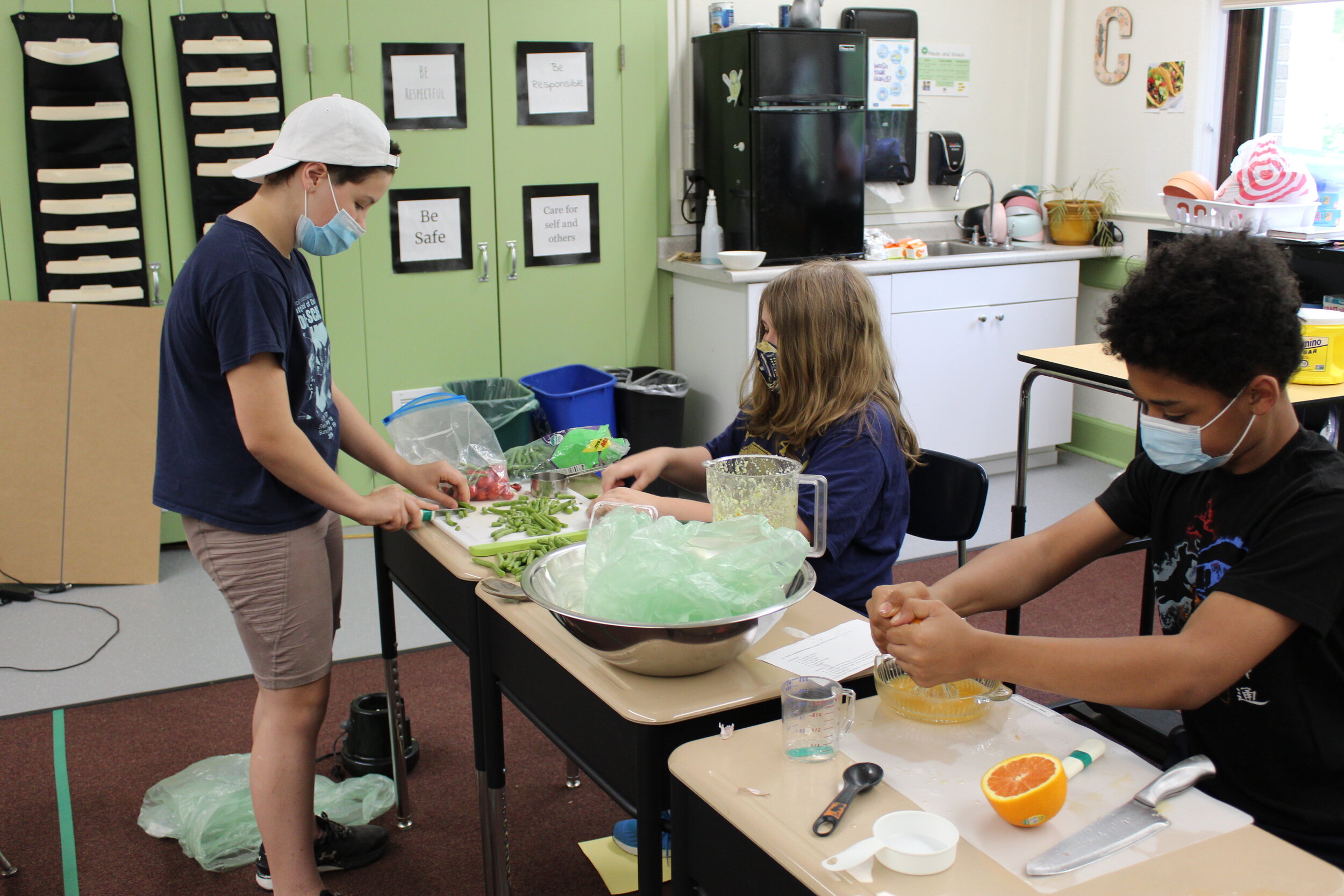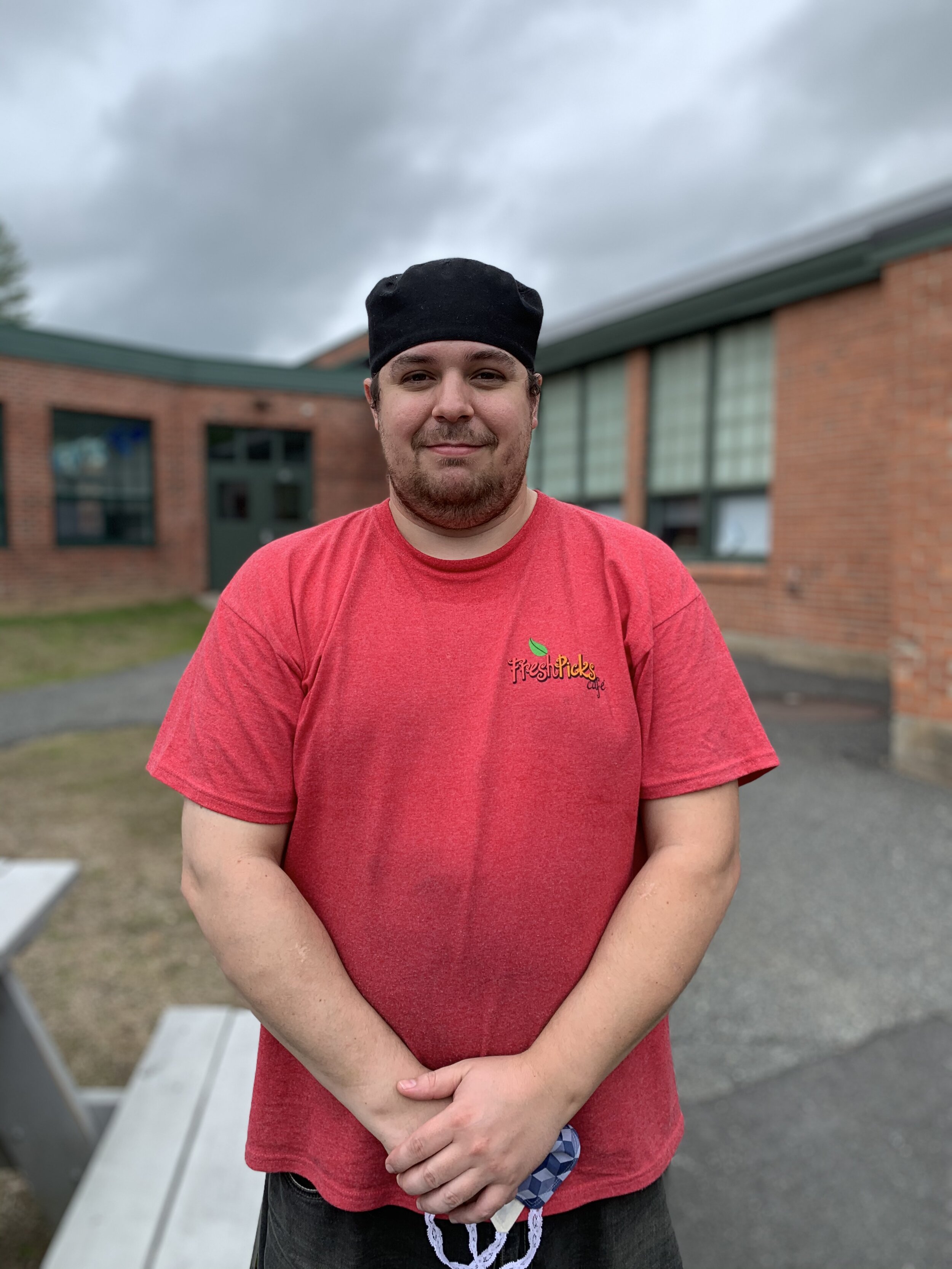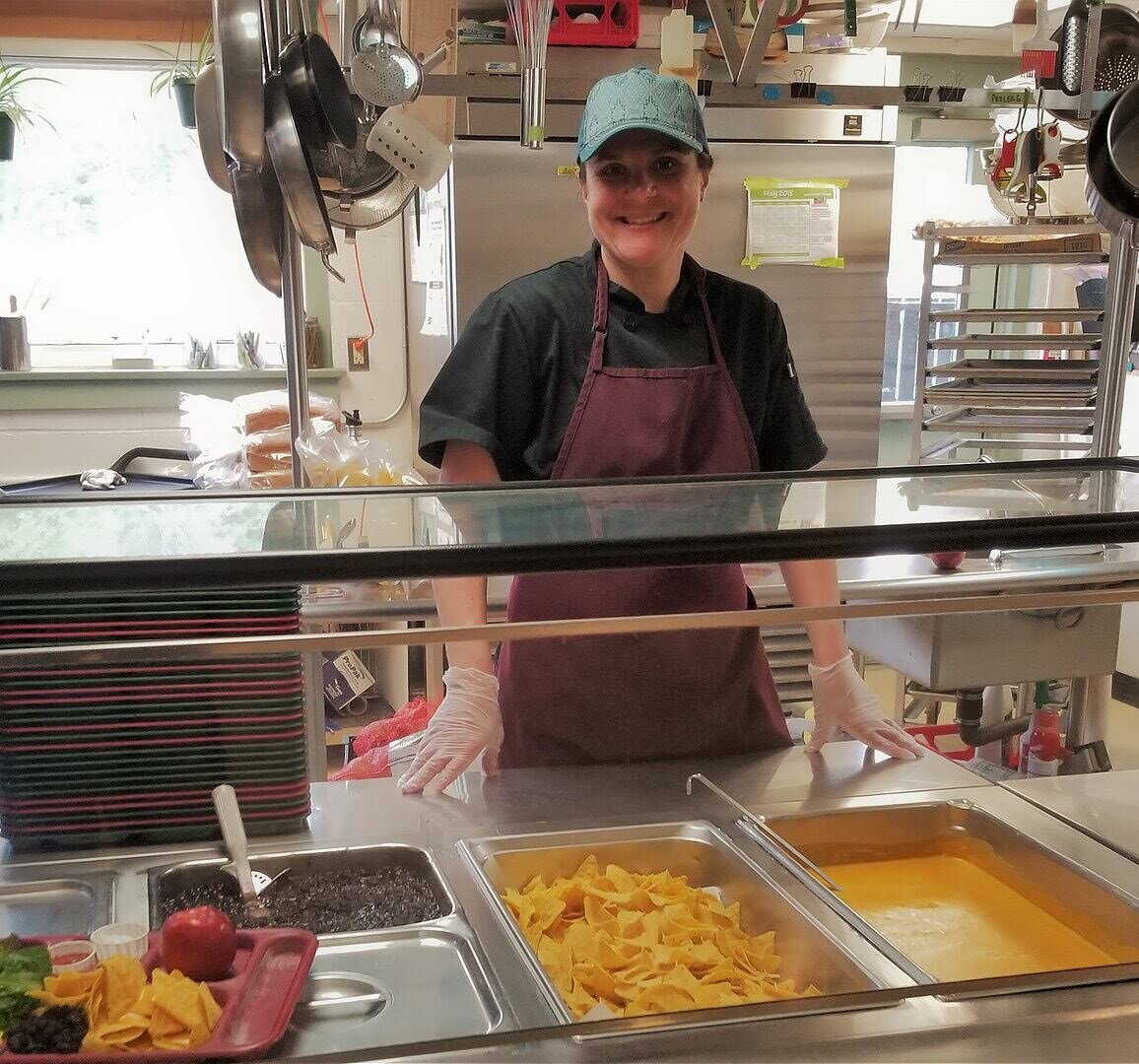Steve Hed has been working at Putney Central School for more than five years. He began in a part-time position as the school’s sustainability coordinator. He stepped into the additional role of Food Service Director when the school meal program went independent several years ago. We sat down with him last spring to discuss the impact of the COVID-19 pandemic on his work and the school community during the school closure.
Sheila Humphreys (SH-FC): How has your work changed since school closures and COVID-19?
Steve Hed (SH): In one sense, not all that much. My day has been rearranged in terms of how things happen, but I still do a lot of the same things. I used to come in at 6:00 AM to get breakfast started, but now we're doing both meals together, so I come in around 7:00 AM. My day is very full because we used to get breakfast done first, then get lunch ready by 11:30 for the first lunch and 12:15 for the second lunch. Now we have to get both meals ready by 11:30 when the buses leave, so the morning is a real crunch. A lot of our food is scratch-cooked. There are certain things that you don't want to make days ahead, while some things do work better days ahead, like chili. Today we’re serving a turkey, lettuce, and tomato sandwich, and we want that to be fresh. It’s very time-consuming to assemble 125 sandwiches! The whole meal preparation system has changed. It's gotten crunched into a shorter period of time in the morning.
One thing that's a little bit easier is that we have a really extensive salad bar during the school year, but now we don't have the salad bar. That's one big piece of food prep that’s been taken out, which is definitely helpful. There are also a few other items that just don't travel well, so the diversity of what we serve has diminished. We've really tried to come up with interesting lunches so that the kids aren’t just getting hamburgers and hot dogs every day or something like that. We don't do pizza anymore, which is really different. That was our big day! If you want pizza to travel well, you need to make it the day before and then chill it and send it chilled. All of our pizzas are homemade. We make the dough and the sauces ourselves. We were thinking of doing pizza, but shortly after COVID-19 started, you couldn't get flour and yeast. Yeast is still almost impossible to find right now, and we haven’t been able to get whole wheat flour for quite a while. So that kind of threw pizza out the window for us. We could have bought frozen pizza dough, but we just don't like it. So we've decided to take pizza off. We're trying new things instead, like a gluten-free, vegan quinoa salad now with garbanzo beans for protein, and all kinds of veggies. It's something new, and it seems to be a real hit. We're also doing a Peruvian recipe for black bean and rice burritos which is also a big hit. We're trying some new things that are really filling and also travel well.
As far as paperwork, In one sense, the paperwork has gotten easier. I don't have to deal with a lot of the daily point of sale details, but we have other meal count sheets that we have to do. I'm constantly having to keep up with waivers and changes from the state. It's hard to know, on a day-to-day basis, whether you're doing things according to the code.
Another thing that’s been added to my job is managing the delivery system because we're delivering to houses and neighborhoods. I've got a whole database of families and addresses, and I’m trying to constantly keep in contact to find out what people need, food allergies, etc. Keeping track of all that is a whole new aspect to my job, but the system is working, and the more organized we are with it all, the better things work. One hard part has been trying to figure out how to get everything really organized so that it moves like clockwork. Finally, I think I'm getting there!
SH-FC: What's been keeping you going during these times?
SH: During the first couple of weeks, when our small kitchen staff was doing it all, we were thinking, “there's no way we can keep this going.” We are a pretty small group, and, all of a sudden, we had to send the meals out by bus, and we had no packaging materials. I spent thousands of dollars buying packaging materials and trying to figure out what works and what doesn't. I had that whole headache in the beginning of trying to figure out everything.
Once we realized there was just no way that we could do it by ourselves, things changed. Some of the paraeducators started calling and saying, “Hey, we want to help out.” Once we figured out how to add their support, that helped immensely. Before, we were kind of insular. We weren’t seeing any of the kids—we were just sending food on the bus. We enjoy the cooking part of our jobs, but the biggest thing that we like is serving the kids. It's fun to see them take the food, and with our salad bar, they're always excited and trying new things. It's the relationship between the food and the kids that keeps you going during the school year, even though, of course, it’s frustrating sometimes.
The first thing that happened with the paras helping us out is that it added a whole new dimension. You can hear them in there now talking to each other while they work, and it just kind of takes your mind off of things.
What started happening next is that we started getting emails from some of the families and cards from the kids, and they were SO appreciative. Once we started having that connection again we realized our purpose, that we do have a purpose and that what we’ve been doing is appreciated and people need it.
In some of the staff meetings that we do on Zoom, people would ask us, “How's it going?” In the beginning, we would say,” I think we're doing okay.” And then some of the teachers would chime in and say, “Hey, sometimes when we're in the middle of the zoom lesson, the kids will say, ‘Oh, I gotta go, my food is here.’” And they told us that it’s the highlight of the kids’ day when they get their bag of food, and they want to know, “what's in my bag?” and there’s this excitement about everything. A lot of parents then have told us that the meal delivery is the one truly structured part of their day. Every day they know this is going to happen, the kids are waiting for it, and they can plan around it. It’s the community that has been keeping me going once I realized that these meals are as important as they are. It was hard to know that in the beginning because we weren’t seeing the kids. I've ridden the bus several times just to see, and that helps me, particularly when I can see and wave to the kids.
SH-FC: What has been your biggest challenge during this time?
SH: My biggest challenge has been wrapping my head around it all. There's so much going on, so many little details—from getting everything organized on a daily basis to figuring out what to order to doing constant inventorying to figuring out what we have, especially with the packaging. On top of that, the availability of food and supplies changes almost daily. One day you can get something but the next day, you can't. So I create a menu, and then I find out there's no more ham available anymore. And so I have to change up on the fly. So it's a challenge wrapping my head around the whole structure of how to run the meal program with so many unknowns. During a regular school year, everything is planned out. Adapting to changes on a constant basis is probably my biggest challenge.
SH-FC: How can the community support you and other food service workers during this time?
SH: They already are! We've got a whole list of volunteers, and we haven't had to dig that deep into it yet because we have this group of volunteers right now who are so dedicated to it. Extremely dedicated. Frankly, we could not do it without these volunteers. We'd be going crazy by now without them! Just knowing that they're all here, and every once in a while, they say, “Hey, do you need more help?” We know they're always willing to help.
And this community has also supported us. We came in one day, and there were signs all over the school saying, “Thanks for feeding our kids!” You could tell a lot of the kids had made signs, and the place was plastered with signs. And in one of the emails that I sent out to the families, I said I wanted to really thank all the people that are involved in getting the meals out, and soon after, one little first grader with her family snuck in and delivered goodie bags to all of us! They were really cute bags. We all got a barbeque mitt and tongs and spatulas and ketchup and mustard. It was awesome and just out of the blue! It's all the little things that this community is constantly doing that really help. I have been really impressed with this town and how everyone has pulled together. And we had a huge parade of all the school staff. There were 50 cars, and we drove the bus routes, and all the people were out waving, and the kids were out and they had signs. We did it to cheer them on, and they ended up cheering us on too! It was really impressive. It took about three hours to drive all around town. It was nice—we got to see the whole town and where the kids live. It shrunk the community size in the sense that we suddenly became aware of where everybody lives. A lot of the teachers who don't live in Putney, or even some of the ones that do, have never been in some of these neighborhoods. We really got to know our town. That’s one of the things that has happened is that we've grown closer as a community and gotten to know each other more. I know a lot more people that I never knew before, and I know where a lot of people live, which is kind of nice. It gives us some context to the families.
SH-FC: What advice would you give to someone who's interested in a career in school food service?
SH: Be patient. This work involves a lot of patience. I'm not even sure how to explain that, but it does. It’s a good job if you love to cook for people, particularly cooking healthy and interesting things for people.
It’s a creative process, trying to come up with new ideas and getting kids interested in trying new foods. As far as patience goes, you’ve got to love kids. If you don't like kids, there's no sense of being there. What all of us say here is that “We're here to feed kids.” It's not just a job. We're here because we want them to eat well, and whatever we do is keeping that in mind.
It's the same challenge for families. Kids say, “I don't want to eat that spinach!” How can you educate them and help them try things that they ordinarily would never try and get them interested in new things? On top of that, it’s about the health aspect of nutrition, why it's important, and how it can help the kids, whether it's intellectually, emotionally, etc. For example, just about everyone, including myself, loves sugar and fatty foods. It’s important to teach kids how to control that and realize that sometimes it's inappropriate to eat those foods, and we've got to look at the bigger picture.
Through the food service and through gardening and health classes, different teachers reiterate these things in different ways. Food service should be such a huge part of the curriculum because teaching kids, particularly at a young age, how to eat right now, just like learning ABCs, can impact them positively or negatively throughout their whole life. This goes beyond what we can do here, in elementary school, but it can be built on in middle school or high school with other educational curricula, the concept that what you do now can affect even your economic situation and your health later on.
As far as going into working in food service, you’ve got to come into it with a holistic approach. If you're just there for a job and you want to punch in and punch out, then it's probably not the best career for you, but if you really care about the kids, and you really want to interact with them, it’s great. We get to know every single kid in the school!
SH-FC: What brings you joy?
SH: Having my hands in the dirt! My biggest joy is growing food and teaching kids about it. That's really what I enjoy. I love teaching, and my garden is my classroom. You can do so much there! Watching kids become so empowered by growing, harvesting, bringing to the kitchen and eating what they've grown, and talking about it with their friends is very inspiring. That is the epitome of what the food service should be as part of a school if it's possible. I know not everyone has the luxury that we have, with all this space for gardens, but if this can be done on some level at many, many schools, I think that's where you're going to start seeing real change. My joy would be seeing kids grow through being empowered to take control of a lot of the things that they do at school. Kids are the best teachers for each other. If one kid learns something really well, they're the ones that are really going to get others excited about it. Kids love learning! My definition of a successful education has nothing to do with testing. Successful education is purely teaching children to love to learn. If you crack that code, if kids can learn to love to learn, then they're going to learn by themselves,
SH-FC: One last question, what's something that you're grateful for?
SH: I’m grateful for the people I work with. In spite of everything going on, this has been one of the most heartwarming experiences, just to see how everyone is coming together. It's amazing.
SH-FC: Any last words?
SH: I hoped this whole thing would be over by now, but it's not going to be. I'll have some time over the summer to come up with ideas of how we're gonna move on from here. It's weird. The reason people work in the schools is to work with kids. To not see them in person is really bizarre, so I’ll keep coming up with innovative ways to improve the experience.




































